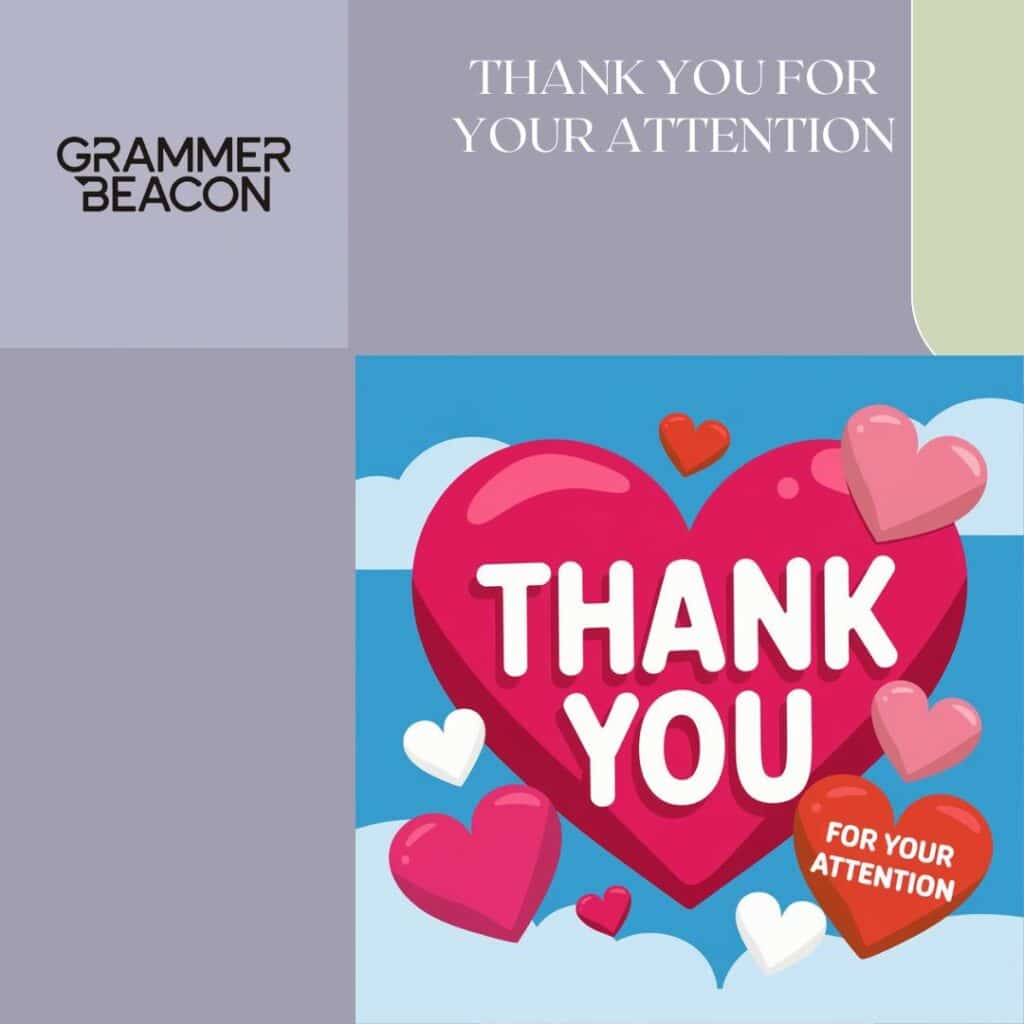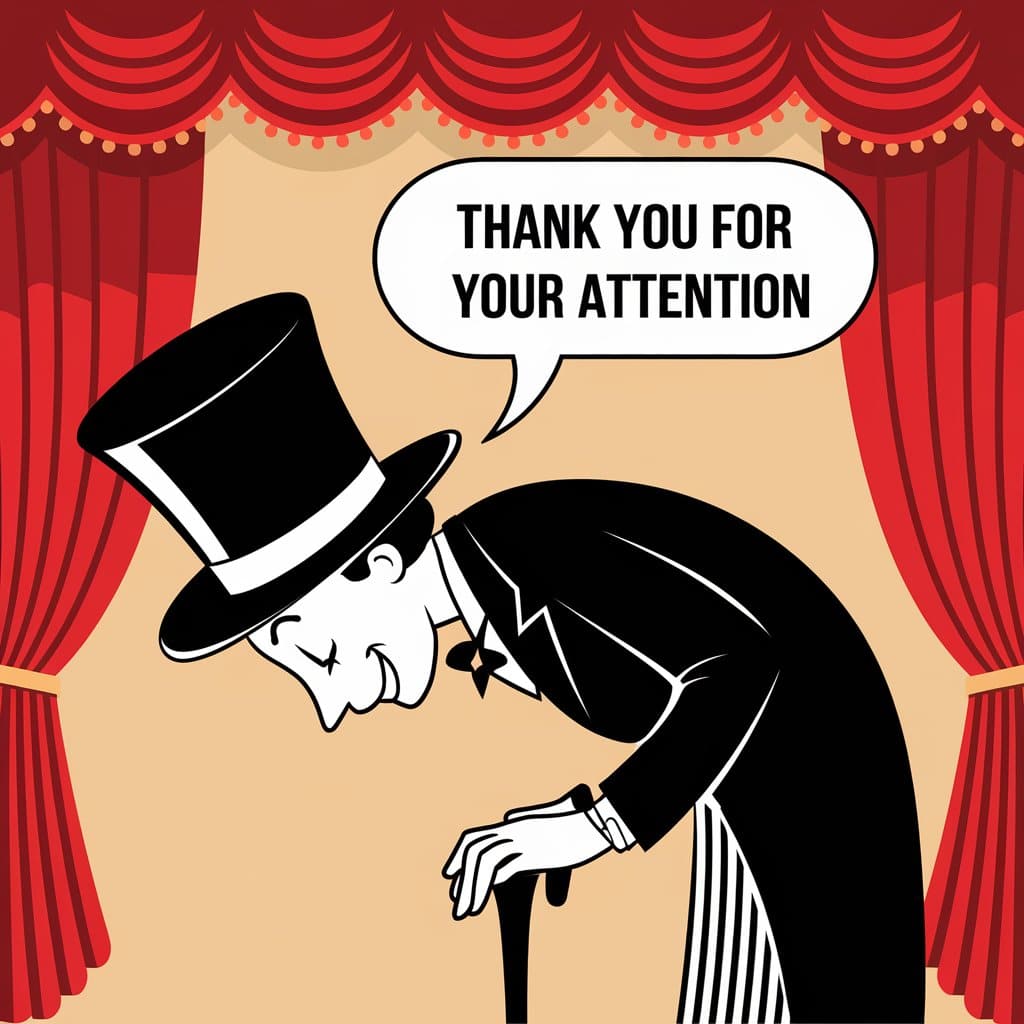Introduction
When communicating, expressing appreciation is key to maintaining positive relationships, whether in a professional setting or informal conversation.
If you often find yourself using the phrase “Thank you for your attention,” you might be looking for some alternative phrases to add variety and nuance to your messages
. This article explores several gratitude expressions that you can use, complete with scenario examples to illustrate their effectiveness.
1. Thank You for Your Time (Formal)
“Thank you for your time” is a formal yet warm way to express gratitude. It acknowledges that the recipient has invested time in listening or reviewing something you presented.
Scenario Example
Email to a Client
Subject: Follow-Up on Our Recent Meeting
Dear Ms. Johnson,
I hope this message finds you well.
I wanted to take a moment to thank you for your time during our meeting yesterday. Your insights were incredibly valuable, and I am excited about the potential for our collaboration.
Should you have any further questions or need additional information, please do not hesitate to reach out.
Thank you once again for your time and consideration.
Best regards,
John Smith
2. Thanks for Listening (Informal)
In more casual or informal settings, “Thanks for listening” works well. This phrase conveys appreciation in a relaxed and friendly manner.
Scenario Example
Text Message to a Friend
Hey Emily,
Just wanted to say thanks for listening to me rant about my workday. It really helped me unwind. Let’s catch up over coffee soon!
See you!
Sarah

3. I Appreciate Your Insight (Professional)
When someone has provided valuable feedback or insights, saying “I appreciate your insight” highlights their contribution and shows respect for their expertise.
Scenario Example
Follow-Up Email After a Workshop
Subject: Appreciation for Your Insight
Hi David,
Thank you for attending my workshop yesterday. I appreciate your insight on the new marketing strategies we discussed. Your input will definitely help us refine our approach.
Looking forward to implementing these ideas and seeing where they take us. Feel free to reach out if you have any more suggestions.
Best,
Anna Lee
Read more :Totalling or Totaling – Grammar Beacon

4. Your Feedback is Valuable (Professional)
“Your feedback is valuable” is another formal way to express gratitude, particularly when someone has reviewed or critiqued your work.
Scenario Example
Email After Receiving Feedback
Subject: Thanks for Your Feedback
Dear Mr. Thompson,
I wanted to thank you for your feedback on the project proposal. Your feedback is valuable and will be instrumental in improving the final draft.
I will incorporate your suggestions and get back to you shortly with the revised version.
Sincerely,
Laura Martinez
5. I’m Grateful for Your Support (Formal)
If someone has supported you in a significant way, “I’m grateful for your support” conveys deep appreciation.
Scenario Example
Letter to a Mentor
Dear Dr. Reynolds,
I wanted to express how much I’m grateful for your support throughout my research. Your guidance has been invaluable and has greatly contributed to the success of my project.
Thank you for your unwavering encouragement and assistance.
Warm regards,
James Brown
6. Your Time is Appreciated (Formal)
“Your time is appreciated” is a respectful way to acknowledge that someone has taken time out of their schedule for you.
Scenario Example
Email to a Potential Partner
Subject: Appreciation for Your Time
Dear Ms. Carter,
I wanted to reach out and say your time is appreciated. The discussion we had about the potential partnership was enlightening, and I’m enthusiastic about the possibilities ahead.
Thank you again for your consideration.
Best,
Emily White
Read more :Community’s or Communities or Communities? – Grammar Beacon
7. Many Thanks (Informal)
In informal communication, “Many thanks” is a friendly and straightforward way to express gratitude.
Scenario Example
Social Media Post
Just wanted to say many thanks to everyone who helped organize the charity event. It was a huge success thanks to your support!
Cheers,
Tom
8. I Value Your Contribution (Professional)
When someone has made a significant contribution to a project or discussion, “I value your contribution” is a great way to show appreciation.
Scenario Example
Team Email
Subject: Thank You for Your Contribution
Hi Team,
I want to extend my sincere thanks to each of you for your hard work on the recent project. I value your contribution and am grateful for the dedication you all showed.
Let’s keep up the great work as we move forward with the next phase.
Best,
Alex
Read more : Other Ways to Say Thank You For Responding Quickly – Grammar Beacon
9. Your Efforts Are Much Appreciated (Formal)
“Your efforts are much appreciated” is a formal way to acknowledge the hard work someone has put into something.
Scenario Example
Thank You Letter
Dear Mr. Garcia,
I wanted to express how your efforts are much appreciated regarding the recent audit. Your thorough analysis and detailed report were critical to the process.
Thank you once again for your diligence and hard work.
Sincerely,
Rebecca Adams
10. I’m Thankful for Your Assistance (Formal)
“I’m thankful for your assistance” is another way to convey gratitude, especially when someone has provided significant help.
Scenario Example
Email After Receiving Help
Subject: Appreciation for Your Assistance
Dear Dr. Kumar,
I’m writing to thank you for your assistance with the recent research project. Your support and guidance were instrumental in navigating the challenges we faced.
Thank you for your continued help and expertise.
Kind regards,
Lisa Walker
11. Thank You for Your Consideration (Formal)
“Thank you for your consideration” is commonly used in formal contexts, especially in applications or proposals.
Scenario Example
Cover Letter
Dear Hiring Manager,
I am excited about the opportunity to apply for the position of Marketing Manager. Thank you for your consideration of my application. I look forward to the possibility of discussing how my skills and experiences align with the needs of your team.
Sincerely,
Mark Johnson
Read more :Understanding Possessives: Story’s or Stories or Stories’ – Grammar Beacon

Read more : Cacoon vs Cocoon Spelling – Grammar Beacon
12. Your Attention to This Matter is Appreciated (Formal)
When you need to express thanks for someone’s attention to a specific issue, “Your attention to this matter is appreciated” is appropriate.
Scenario Example
Email Regarding a Complaint
Subject: Follow-Up on Recent Issue
Dear Ms. Lee,
I wanted to thank you for your prompt response to my recent complaint. Your attention to this matter is appreciated, and I am hopeful for a resolution soon.
Thank you once again for your assistance.
Best regards,
Karen Davis
13. Grateful for Your Time and Effort (Formal)
“Grateful for your time and effort” acknowledges both the time someone has spent and the effort they’ve put in.
Scenario Example
Thank You Note
Dear Mrs. Stevens,
I wanted to let you know how grateful for your time and effort I am. Your dedication to the project has not gone unnoticed, and I deeply appreciate the hard work you’ve put in.
Thank you for your commitment.
Warm regards,
Michael Green
14. I Truly Appreciate Your Help (Informal)
In a more casual tone, “I truly appreciate your help” conveys sincere thanks in a personal way.
Scenario Example
Text Message to a Colleague
Hey Jake,
Just wanted to say I truly appreciate your help with that report. It made a huge difference. Let me know if you need anything from me!
Cheers,
Linda
15. Thanks a Lot (Informal)
“Thanks a lot” is a simple and effective way to show gratitude in everyday interactions.
Scenario Example
Chat Message
Thanks a lot for covering my shift last minute! You really saved the day.
Best,
Chris
Is It Correct to Say “Thank You for Your Attention”?
While “Thank you for your attention” is grammatically correct and polite, it can sometimes come off as a bit formal or impersonal, especially in casual conversations. Depending on the context, using one of the alternative phrases discussed above might convey your gratitude in a more fitting manner.

Conclusion
Choosing the right phrase to express gratitude depends on the context and your relationship with the recipient. Whether you’re sending a formal email or a casual text,
having a range of alternative phrases at your disposal can make your expressions of appreciation more varied and impactful. By mixing up your language and using these gratitude expressions thoughtfully, you can ensure your thanks always come across as sincere and engaging.

James Logan is a seasoned blogger and language enthusiast behind Grammar Beacon. With years of experience in grammar and writing, James shares his expertise through insightful and engaging content. His passion for clear communication and linguistic precision shines in every post, making complex grammar concepts accessible and enjoyable for readers. Follow James for expert advice and tips to refine your writing skills.







